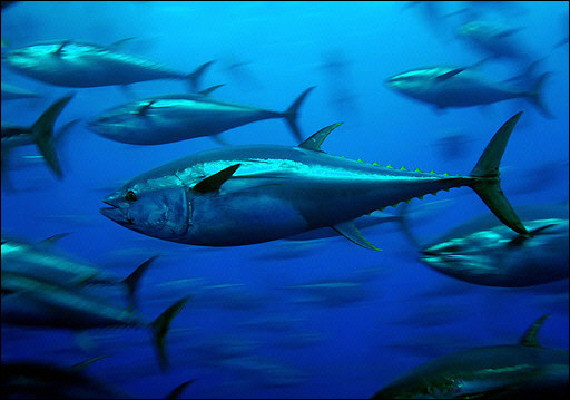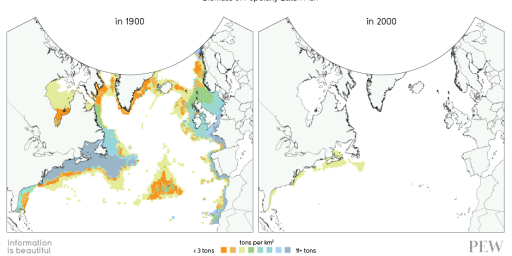Blue Fin Tuna, Genetically Altered Salmon and Environmental Progress
"It's illogical to hunt a species to extinction." - Spock
The New York Times Magazine has an excellent (and long) article on the demise of blue fin tuna and the possible responses to it. However, to get to the good part you have to wade through some typical Greenpeace silliness:
But as the Zodiacs approached the French tuna-fishing boat Jean-Marie Christian VI, confusion engulfed the scene. As anticipated, the French seiner launched its skiffs and started to draw a net closed around the tuna school. Upon seeing the Greenpeace Zodiacs zooming in, the captain of the Jean-Marie Christian VI issued a call. “Mayday!” he shouted over the radio. “Pirate attack!” Other tuna boats responded to the alert and arrived to help. The Greenpeace activists identified themselves over the VHF, announcing they were staging a “peaceful action.”
Aboard one Zodiac, Frank Hewetson, a 20-year Greenpeace veteran who in his salad days as a protester scaled the first BP deepwater oil rigs off Scotland, tried to direct his pilot toward the net so that he could throw a daisy chain of sandbags over its floating edge and allow the bluefin to escape. But before Hewetson could deploy his gear, a French fishing skiff rammed his Zodiac. A moment later Hewetson was dragged by the leg toward the bow. “At first I thought I’d been lassoed,” Hewetson later told me from his hospital bed in London. “But then I looked down. ” A fisherman trying to puncture the Zodiac had swung a three-pronged grappling hook attached to a rope into the boat and snagged Hewetson clean through his leg between the bone and the calf muscle. (Using the old language of whale protests, Greenpeace would later report to Agence France-Presse that Hewetson had been “harpooned.”)
Basically, Greenpeace was trying to dislodge the fishermen’s net and the fishermen, not unreasonably, thought they were pirates, rammed them and in the process hooked one of the protestors. I realize the political process is slow to the point of agony, but Greenpeace needs to be smarter than this.
Back to the article, in essence, the author is arguing that the demise of blue fin tuna is a point of change where we realize that the ocean is not a limitless supply of food and that we need to focus in on a few fish (four, actually) that can be farmed in a sustainable way:
But appetites continued to outstrip supply. Global seafood consumption has increased consistently to the point where we now remove more wild fish and shellfish from the oceans every year than the weight of the human population of China. This latest surge has taken us past the Age of Cod and landed us squarely in the Age of Tuna. Fishing has expanded over the continental shelves into the international no-man’s territory known as the high seas — the ocean territory that begins outside of national “exclusive economic zones,” or E.E.Z.’s, usually 200 nautical miles out from a country’s coast, and continues until it hits the E.E.Z. of another country. The high seas are owned by no one and governed by largely feeble multinational agreements. According to the Sea Around Us project of the University of British Columbia’s Fisheries Center, catches from the high seas have risen by 700 percent in the last half-century, and much of that increase is tuna. Moreover, because tuna cross so many boundaries, even when tuna do leave the high seas and tarry in any one nation’s territorial waters (as Atlantic bluefin usually do), they remain under the foggy international jurisdiction of poorly enforced tuna treaties.
The essentially ownerless nature of tuna has led to the last great wild-fish gold rush the world may ever see. The most noticeable result of this has been the decline of the giant Atlantic bluefin tuna. But the Atlantic bluefin is just a symptom of a metastasizing tuna disease. The United Nations’ Food and Agriculture Organization reports that 7 of the 23 commercially fished tuna stocksare overfished or depleted. An additional nine stocks are also threatened. The Pew Environment Group’s tuna campaign asserts that “the boats seeking these tuna are responsible for more hooks and nets in the water than any other fishery.”
Tuna then are both a real thing and a metaphor. Literally they are one of the last big public supplies of wild fish left in the world. Metaphorically they are the terminus of an idea: that the ocean is an endless resource where new fish can always be found. In the years to come we can treat tuna as a mile marker to zoom past on our way toward annihilating the wild ocean or as a stop sign that compels us to turn back and radically reconsider.
Only time will tell if tuna is a “mile marker” or not, but it’s never too soon to begin treating overfishing as a tragedy of the commons, which it is, and begin handling it accordingly. No doubt a mixed approach will be necessary that will contain market mechanisms and some instances of command and control. As for market mechanisms, I would prefer a system of tradable fishing quotas. In essence, there would be a permit that entitled existing fishermen to catch a certain amount of fish each year in an area and the permit would be tradable, creating a transferrable property right that would have value, much like the medallion system for taxi cabs in New York City (though that’s not a commons problem).
A fisherman who wanted to exit fishing at some point, either for retirement or to start a new career, could sell his permit to another fisherman. The benefits to this seem obvious to me, such as creating a method for fishermen to exit or enter the profession based on how much it’s worth to them while also giving them a sort of “ownership” of the ocean. Alone though, it won’t be enough.
The article goes into some detail discussing the existing treaty arrangements and the potential solutions to the larger problem of overfishing. For once, this is an area where the UN’s involvement is essential and welcome, to me. We’re dealing with a resource that’s in international waters and no other organization has jurisdiction. Of course, treaties will be needed and command and control policies, such as a ban on fishing in large parts of the ocean, might be necessary to allow fisheries to recover.
There’s another article that’s quite interesting on genetically engineered salmon that I wanted to address, but this post is quite long already. I’ll leave you with a comment from the article’s comment section (#236) that’s nothing more than a leftist laundry list of Luddite laments:
Scientists are killing us with their good intentions. Chernobyl, Deep water drilling, Bhopal, Roundup Ready soybeans, genetically modified fast growing chickens, cows and now fish. This planet is going to hell in a handbasket. The problem is overpopulation, greed and ignorance compounded by “scientific breakthroughs” that allow overpopulation, greed and ignorance to continue uninterupted.
Now most of these aren’t even necessarily bad, but that’s a discussion for another time. Between the far left’s anti-science positions as described above and the far right’s creationism and such, it’s a wonder there was ever a Renaissance or Enlightenment.







I’m fairly certain there was a far right before, during and after the Renaissance and the Enlightenment, but when did the far left come into existence? I’d always thought it was predominantly a 19th and 20th centure phenomenon.
I agree we need to have some sort of international cooperation to help protect the open aceans, but I have no faith in the UN being responsible for it. Sorry.
I think you’re right about the far left, Charles. By involving the UN, the only thing I was hoping for is to avoid a mish-mash of treaties. Enforcement would still come down to individual states, I believe.
Aside from Bhopal, I like most of these (I’m apathetic to Deep Water Drilling). I’ve never understood the obsession that many of my fellow environmentalists have with some illusory “pure nature” in terms of genetics.
Hmmm. Maybe my information is out-of-date but my understanding is that at the present state of the art the sustainability of aquaculture is illusory, mainly because more than a pound of wild caught protein is required to feed a pound of cultivated protein. Perhaps somebody can enlighten me: is aquaculture (any species) sustainable now or is that a future goal?
Brett,
Agreed. Bhopal and Chernobyl were real problems but the others don’t seem that way to me. It’s pretty much a given that as technology improves the planet will support more people and I don’t see that as a bad thing.
Dave,
The article addresses some of that at the end. It’s around 1.6 and they’re trying to improve it.
Oh and blue fin is around 15 to 1, so not a lot of hope in farming those without a major technological breakthrough.
Thanks, Robert. Said another way, my understanding remains the case. Aquaculture isn’t sustainable.
The great issue here is political: food independence. IIRC the largest catches are ascribable to Japan, China, Indonesia, and Spain (in that order) and we’re quite a ways farther down on the list. Without its catches of wild fish Japan would be dependent on other countries for protein. Again, I’m working from memory here but I think much of China’s catch is (of course) for export.
Dave,
There’s no reason it can’t be done, it’s just not going to be a complete replacement for catching fish in the wild until technology catches up. In the mean time we can have tradable quotas. We’ll end up with more expensive seafood for a time but as technology advances, even that will give way.
Guys you can’t be “far right” without having something to be “far right” of hence there’s always been a left and a right in this world according to your definitions. For god’s sake people 1000 years ago didn’t just magically agree on everything unlike today..
Brett want to know one of the big reasons of the fall of the small farmer? With roundup it’s not really the product so much as the owner’s (Monsanto) ridiculous policies governing said product (including suing those that don’t use it).
To me this whole left vs right crap is a 19th century creation…
The Right and Left began in the Garden of Eden when God spake saying: No apples for you, and for My sake, put on some clothing you Me-damned hippies!
And Adam and Eve spake back, saying, “You are harshing our mellow, man, we are outta here.” And added, “Fight the Power!”
Much later of course God’s own kid veered sharply left with his whole Blessed are the non-jugmental, blessed are the cool, peroration.
Let’s have a fin tax, we’ll have a global market exchange on the price of fins, the market will fix itself (notice the sarcastic allusion to carbon trading).
matt,
We knew what we were talking about. Did you have an on-topic comment?
Rather disturbing when you consider that not “allowing overpopulation to continue uninterupted” is just a sterile euphemism for letting millions of people in the developing world to starve to death. But then, as P. J. O’Rourke once noted, fretting about overpopulation is just the politically correct way to be racist. Just enough of me, way too many of you.
Stormy,
I kind of agree, but it overstates the case. Myself, I’m more of a Julian Simon type.
Chapter and verse from the book of Michael! [lol]
What could be more foolish than an atheist claiming to speak for God?
I was actually fishing today, catch and release though.
Most bases seem covered above. I’ll just say I’m very pessimistIc. Some small percentage of the earth’s people are willing to forego fish they can otherwise afford. Too few. To few to support effective limits.
(similar to too few prius drivers, bike riders, and the bs reasons we make up for why we don’t.)
“Between the far left’s anti-science positions as described above and the far right’s creationism and such, it’s a wonder there was ever a Renaissance or Enlightenment.”
Far right and far left whack jobs have more in common than they’d care to admit.
But on the blue fin tuna…A friend of mine went blue fin tuna fishing out of Prince Edward Island a number of years ago. He told me that when the catches were brought in, there were Japanese buyers right at the dock. The tuna were bought, flash frozen, and flown to Japan. I was kinda surprised at this. PEI seems a long way from Tokyo.
You know, I was at lunch a few days ago, talking to friends about the tuna decline. One friend is a recent immigrant who likes US power, so I gave him a solution that he’d enjoy: The US could just declare that it owns all oceans, under nuclear threat, and institute fishing limits everywhere. He loved it.
Sadly, it would probably take something that crazy to work.
Otherwise what, we need the extinction of the Blue Fin to get people to change their attitude? Would even that change the Japanese hunger for blue ocean fish?
I don’t think it’s just preference or, rather, it’s a different preference. Japan wants to preserve its food independence and it doesn’t really have another alternative.
Are a majority of Japanese calories really harvested by Japanese hands? I’d be surprised.
http://www.japanfs.org/en/mailmagazine/newsletter/pages/030007.html
It seems to me that affirms my comment. It is, indeed, a policy. Without commercial fishing Japan would be even more dependent on imports. I don’t know this for certain but I suspect that much of the change in Japan’s food dependency comes as a result of imports from China.
But it doesn’t at all explain why Japanese markets here in OC are full of (expensive) ocean fish, or for that matter why the Japanese pay our fishermen tens of thousands for a single fish.
No, what you’ve got there is the kind of argument (justification) the trade representative of a fish-loving nation would make.
***What could be more foolish than an atheist claiming to speak for God?*** How can Harry be a atheist if he has the same views as the Rev. Jeremiah Wright?
A lot of this can be avoided by feeding the farmed fish on soy or other plant proteins during most of their growth. Feeding the fish (experiments have been done on salmon and a few other spp) vegetable proteins brings down their Omega-3 Fatty Acid:Omega-6 FA ratio to terrestrial meat levels. Feeding them fish meal or fish oils for 2 weeks or so prior to harvest looks like it will bring up the Omega-3 ratio to near wild levels.
G.A.,
I wonder this often, but now I have to ask: are you sure you’re posting in the correct thread?